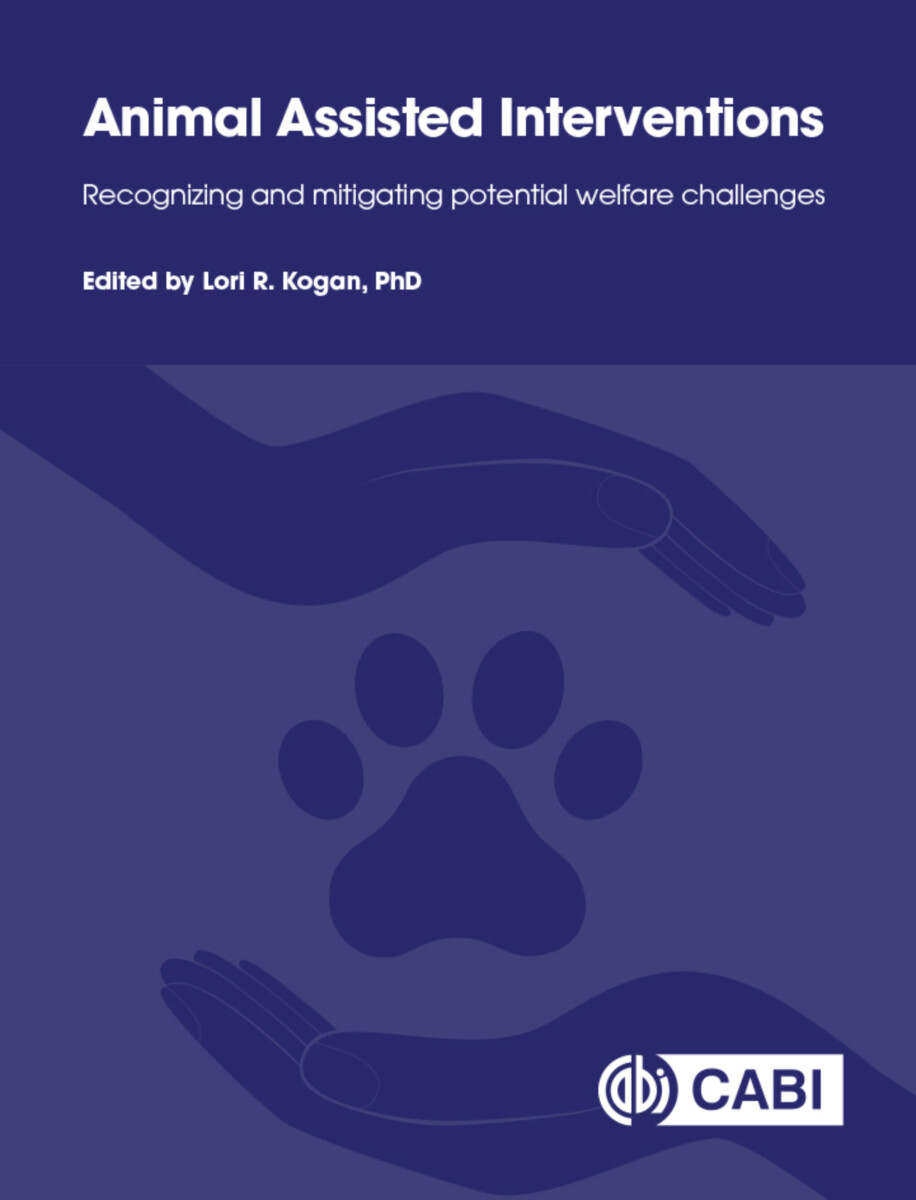Animal Assisted Interventions
Recognizing and Mitigating Potential Welfare Challenges
- Publisher
CABI - Published
19th December 2023 - ISBN 9781800622593
- Language English
- Pages 184 pp.
- Size 7" x 9"
This is a practical book exploring how to conduct animal assisted intervention (AAI) in ways that protect and prioritize animal and human welfare. This resource is for social scientists (e.g., psychology, social work, human development and family studies, etc.), as well as ethologists and animal behavior and welfare students and practitioners. The book is a series of short chapters that depict a wide array of AAIs and their potential welfare concerns. The chapters include descriptions of the AAI offered, the welfare challenges, and ways to successfully mitigate these challenges. This book also covers critical topics including therapy animals' aging, retirement, and death as well as ethical issues including animal consent. Species include not only dogs, but horses, rabbits, and other small animals (e.g., guinea pigs, mice, etc.). Types of AAI involve individual interventions as well as crisis dogs (those who help after natural and man-made disasters), and residential animals. The book is designed to be a practical, engaging book with links to video and examples of real-life situations. It is evidence-based, yet user-friendly and directly applicable to students and practitioners.
This highly practical and engaging book with examples of real life situations, videos and case studies, explores how to conduct animal assisted interventions in ways that protect and prioritize animal and human welfare. The book:
- Explores how to conduct animal assisted intervention (AAI) in ways that protect and prioritize animal and human welfare.
- Discusses potential welfare challenges including how to advocate for the animal, animal consent, and the animal's aging, retirement, or death.
- Evidence based approach to mitigating welfare concerns for a wide range of therapy animals including dogs, horses, rabbits, rodents, and exotic animals - and their recipients.
Contributors
Foreword
Part 1: Welfare
1) The Importance of Animal Welfare in Animal-assisted Services
2) Standards of Practice and Professional Competencies to Protect Welfare and Promote Thriving in AAI
3) Welfare and Well-being Considerations in Dog Selection and Involvement in
Animal-assisted Interventions
4) Equine Welfare in Therapy and Learning Services: an Overview
5) Communicating with “Critters”—Incorporating Small Animals into Animal-assisted Interventions
6) The Therapy Animal’s Bill of Rights
7) Trauma-informed Interspecies Social Justice in AAI
Part 2: Equines
8) Recognizing and Mitigating Potential Welfare Challenges During Equine-assisted
Services for Autistic Youth
9) Striking a Balance Between Welfare and Therapeutic Progress in Equine-assisted Services
10) Freedom, Choice, and Consent in the HERD
11) Acknowledging and Mitigating Professional Compassion Fatigue: Personal Reflections on Animal-assisted Work
12) Time to Say Goodbye: Honoring the Life and Death of a Therapy Horse
Part 3: Crisis Dogs
13) Animal-assisted Interventions and the Lessons Learned—Striving for Safe, Sane, and Humane Interactions
14) Animal-assisted Crisis Response: The Balance Between Work and Welfare
15) Innovative AAI Within a Child Trauma Assessment Center
16) Your Dog to Share
Part 4: Other Animals
17) Benefits and Considerations when Incorporating Farm Animals in Therapeutic Settings
18) Animal-assisted Interventions: Paths to Propagation
19) My Ethical Code: Personal Guidelines for Effective Welfare and Safety Practices in AAI
20) The Three Agendas of Animal-assisted Therapy
Part 5: Children
21) Pawsitive Reading Programs
22) A Dog’s Intuition
23) Establishing an Animal-assisted Therapy Program at a Preschool
24) Children Interacting with Dogs: Challenges and Rewards
25) Before Going Forward, Plan Backward: Prioritizing Welfare During HAIs
26) Reading Doesn’t Have To Be Ruff
27) Canine-assisted Educational Activities in a University Setting: Reflecting on Ways to
Promote Happy and Mutually Beneficial Experiences
28) Enhancing Dog–Human Communication in Animal-assisted Programs
Part 6: Adults
29) Welfare and Safety Considerations in AAI Hospital Programs
30) A Humane Education Journey: Teaching and Learning Compassion
31) Calling Dr. Doolittle: The Clinician’s Role in Monitoring Communication Between Animal
and Client to Maintain Safety During Animal-assisted Psychotherapy Interventions
32) Canine Co-therapists—Special Considerations for Engaging Within Virtual Environments and Navigating Canine Health-status Changes
33) Animal Welfare with AAI in Prisons/Jails
34) The InterProfessional Animal-assisted Wellness (IPAW) Collaborative
35) Safeguarding the Welfare of Therapy Dogs in Clinical Mental Health Practice
36) The Power of Non-verbal Communication
Index
Lori R. Kogan
Lori R. Kogan, Ph.D. is a Professor of Clinical Sciences at Colorado State University. She is the Chair of the Human-Animal Interaction section of the American Psychological Association and Editor of the Human-Animal Interaction Bulletin, an open-access, online publication supported by the American Psychological Association. She has published numerous journal articles and book chapters, and co-edited books including Pet Loss, Grief, and Therapeutic Interventions: Practitioners Navigating the Human-Animal Bond, Clinician's Guide to Treating Companion Animal Issues: Addressing Human-Animal Interaction, and Career Paths in Human-Animal Interaction for Social and Behavioral Scientists and given invited presentations on topics related to human animal interactions in both psychology and veterinary medicine venues. She is currently engaged in several research projects pertaining to the intersection of the human animal bond and veterinary medicine.


